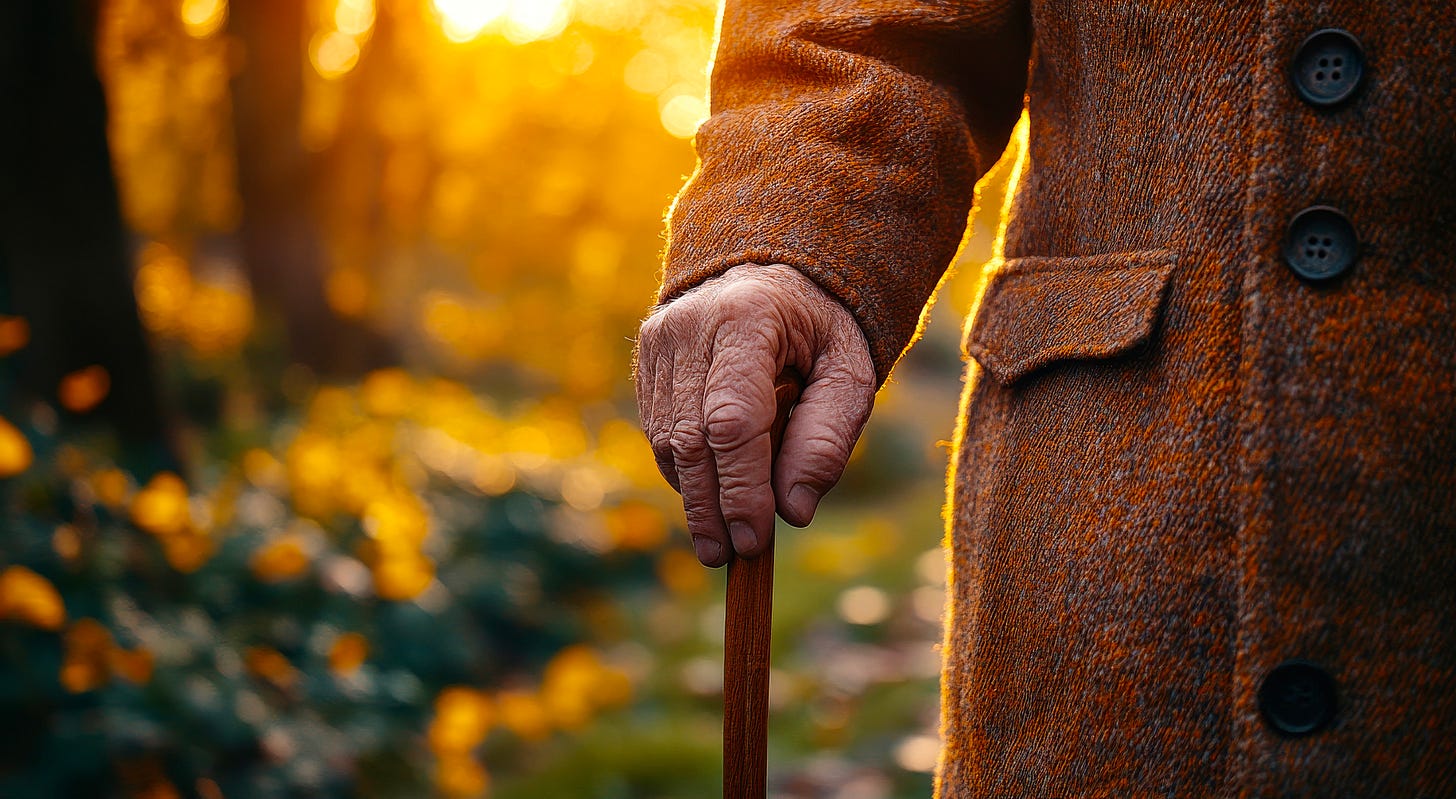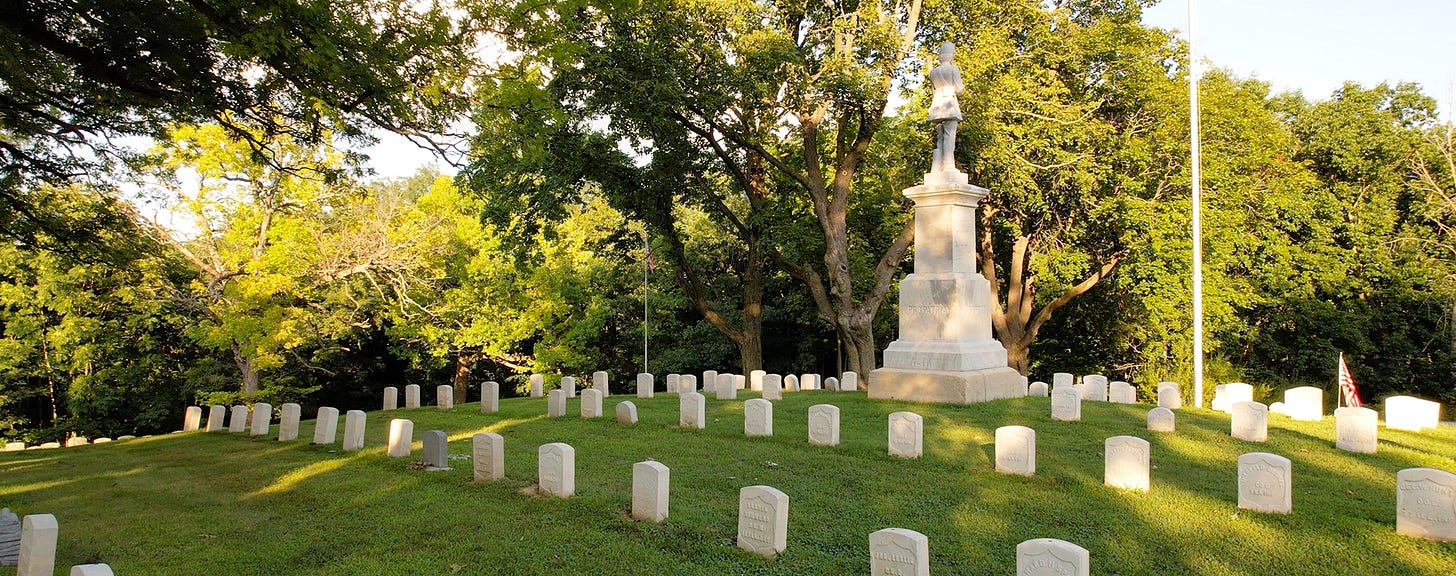[I stole the title of this piece from the late, great John Prine, whose song “Hello In There,” written when he was only 24, is a deeply moving reminder of what it means to be old in the U.S.A. It touched me thirty years ago, and touches me today at 86. If you have a few minutes to spare, PLEASE listen. I think it will touch you, too.]
I. Last weekend, my wife and I drove several hours to attend her 65th high school class reunion. She was born and raised in a city of 25,000 souls, founded in 1851, a city with all the strengths and liabilities of small town Midwestern life, located in a place of great natural beauty. We visited there often when my mother-in-law was alive, and I’ve always found it a refreshing contrast to the overly-affluent and socially mobile Chicago suburb where I grew up.
Time has taken its toll, of course, on the 250-member Class of 1960, whose 150 surviving members are age 83 or so. But 45 of my wife’s classmates, many of them local, were able to attend the reunion. With spouses, friends and assorted others, about 100 folks gathered for a Saturday evening dinner at the Moose Lodge. Not for a moment did I say to myself, “Wow, look at all these old people!” At 86, I might have been the oldest person in the room!
II. After meeting some of my wife’s friends, I sat down at an empty table, wondering what I might find to do in a crowd where I knew hardly anyone and had no shared memories. The answer came when a man and woman joined me across the table. I was there, in the words of Nelle Morton, to “hear people into speech,” to ask, listen, and learn more about lives that are joined with mine in the human community.
The husband, tall, gaunt and taciturn, was using a walker and wearing a Vietnam vet’s cap. I talked with his wife for a while (she was an “outsider” like me), then asked him where he had served. He responded with a very short answer, so I asked another question, which elicited another short answer, and so it went through a series of brief Q&As. It soon became clear he had a story he wanted to tell, but could tell it only one small piece at a time.
Not long after high school, he went into the Air Force and served eighteen months in Vietnam. When I asked if he flew missions, he said, “No, I spent the whole time in an air-conditioned office at a military airport south of Saigon.” When I asked, “What was that like?,” along with a number of follow-up questions, the story of his post-Vietnam life began to emerge:
“See all this?,” he said, pointing to his walker, his hearing aids and his scarred throat. “I’ve been this way for many years, in and out of the VA dozens of times. It’s all due to Agent Orange. Most people think that only those in combat zones were hit by the stuff. But if you breathed in Vietnam during the war, you breathed Agent Orange. The planes that dropped it across the countryside flew in and out of the airport where I was stationed, leaking it all over the place, the fumes coming through the AC into my office.”
III. After a while, it became clear that talking was taking a toll on him. I put my hand over my heart for a long moment, thanked him for his service, and he gave me a nod and a quick smile. That’s when I noticed that a very heavy man and his walker-assisted wife, who said nothing all night, had taken seats to my right. He, too, was wearing a Vietnam vet’s cap, but made no effort to connect to the vet across the table. Unlike my first conversation partner, this man needed no prompting to talk. He was so voluble that he had probably run out of people willing to listen years ago. With just a couple of questions from me, he spent the next 30 minutes telling his story.
With his father’s encouragement, he dropped out of high school at age 16 to take a factory job in town. “We were the best in the world at what we did,” he said. He held that job for the next 45 years, with a two-year hiatus to serve during the Vietnam war. I asked where he’d been stationed, and he said he spent the entire war as a cook at an Army base in Colorado, never going overseas.
At that point, my first conversation partner said, “Lucky you…” sotto voce, while my new partner carried on with stories of his time in Colorado as if the other vet was not at the table. When he ran out of those stories, he turned to the present. He gave me a detailed account of his days at home in his recliner, including his daily meds and supplements, the TV shows on his must-see list, and the programs he followed on the bedside radio he kept on all night. The moment dinner was announced, he struggled to get up, as I thanked him for his service and followed him to the buffet line.
IV. Normally, I’m allergic to people who talk nonstop about themselves without expressing an ounce of interest in anyone else. But I had no such feeling about the men I’d been listening to. Instead, they evoked empathy—and a commitment to spend more time listening to folks who, like all of us, simply want to be seen and heard, whose stories enrich my sense of the range of the human experience.
The reunion lasted four hours, and during that time, I was asked about my life and work only once. Time was when I would have whined about being ignored. But that ended years ago when my inner teacher found my inner child and kicked its little butt: “Get a life, pal! As a writer, you’ve spent years telling your story over and over again! Maybe it’s time to listen to people who’ve not had that chance—people who yearn to be heard before they fall silent—for their sake and yours.”
V. The world is full of people who get little attention, who become more invisible as they age in a culture that “disappears” its elderly. Those of us who get all the attention we need, and more, would do well to listen to them. No one wants to die without at least a few people knowing their story, and I don’t want to die without learning all I can about my fellow travelers on planet earth.
With John Prine, let’s say “Hello In There” to elders who wait quietly for someone to care, to say nothing of young people, immigrants, and all the others who yearn for someone to understand that we are part of one another. Let’s act as if we were Story Corps outposts, opening our hearts and minds to folks who deserve to have their stories received with hospitality and compassion. Doing so would enlarge our lives and might help bridge some of our political divides.
VI. As the reunion wound down, and my wife shared a few long Midwestern goodbyes with old friends, I sat on a bench in front of the Lodge soaking in the life-giving rays of the setting sun, reflecting on what I had heard. After a while, one of the reunion organizers came out on her way home. I thanked her for dealing with the logistics of feeding a big crowd, and she began talking about her work with our brothers and sisters who suffer from housing insecurity:
“I tried to talk the caterer into donating the leftovers to a shelter in town where I volunteer, but he can’t violate OSHA regulations. I enjoy throwing parties for the residents of the building where I live, and the folks at the shelter love it when I bring them the leftover candy and pastries. But I’ve learned that I can’t donate peanuts, and do you know why? It’s not because of allergies, but because so many folks at the shelter don’t have teeth.” She went on for a good ten minutes, decrying the inhumane plight of so many people experiencing homelessness in this wealthy country, until her husband came out and they headed home.
Watching her go, I thought, “She’s returning to her listening post, where she serves some of the most vulnerable among us, then speaks with strangers like me to amplify those voices in a heedless world. It’s good to know that this American sensibility is still alive and well in the midst of the MAGA regime’s cruelty and depravity. Long live those who hear and pass along the stories of those who are rarely heard. May we learn to listen, and more: may we keep giving voice to the old, old story of what it means to be human.”
P.S. If you happen to know the town I’m writing about, please don’t name it in your comment. I want to protect the anonymity of all concerned.
[NOTES: My 10 books are HERE and HERE. The Center for Courage & Renewal is HERE. I post on Substack every Friday, as time and energy allow. Free as well as paid subscriptions will always have access to everything I post.]





I'm an exhausted hospital chaplain at a downtown hospital filled with the homeless and mentally challenged. Your words today have given me strength to keep listening, keep connecting, keep creating space for a person's voice to be heard. Im now feeling a call to amplify their voices. Thank you for reminding me that that can happen anywhere. 💜
I was doing interviews in 2020, and came across a man who had just come out of rehab. And when I got to the question about if he'd served in the military, he didn't want to admit that he'd fought in Vietnam. He thought it would be a blemish in his story. But when I assured him that we wanted to honor that time, he lit up so much he was almost in tears and he brought me to a wall in his house covered with medals and memorabilia of that time.
So many lessons to be learned. I wonder how the people being forced to fight and dominate, particularly in Gaza, Ukraine, and our southern border, are going to heal....and what the moral consequences will be down the road.